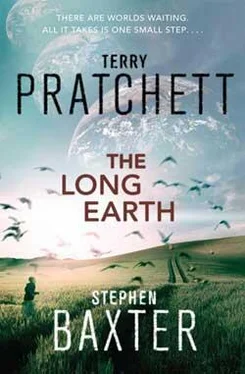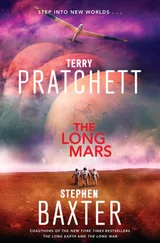Terry Pratchett, Stephen Baxter
The Long Earth
For Lyn and Rhianna, as always
— T.P .

The plan for Willis Linsay’s original ‘Stepper’ as anonymously posted online. (please note: the publisher accepts no responsibility for the inappropriate use of this diagram or the technology it represents.)
IN A FOREST GLADE:
Private Percy woke up to birdsong. It was a long time since he had heard birdsong, the guns saw to that. For a while he was content to lie there in the blissful quiet.
Although he was slightly worried, in a concussed kind of way, why he was lying in damp though fragrant grass and not on his bedroll. Ah yes, fragrant grass, there hadn’t been much fragrance where he’d just been! Cordite, hot oil, burned flesh and the stink of unwashed men, that was what he was used to.
He wondered if he was dead. After all, it had been a fearsome bombardment.
Well, if he was dead then this would do for a heaven, after the hell of noise and screams and mud. And if it wasn’t heaven, then his sergeant would be giving him a kicking, pulling him up, looking him over and sending him down to the mess for a cup of tea and a wad. But there was no sergeant, and no noise except the birdsong in the trees.
And, as dawn light seeped into the sky, he wondered, ‘ What trees?’
When had he last seen a tree that was even vaguely in the shape of a tree, let alone a tree with all its leaves, a tree not smashed to splinters by the shelling? And yet here were trees, lots of trees, a forest of trees.
Private Percy was a practical and methodical young man, and therefore decided, in this dream, not to worry about trees, trees had never tried to kill him. He lay back, and must’ve dozed off for a while. Because when he opened his eyes again it was full daylight, and he was thirsty.
Daylight, but where? Well, France. It had to be France. Percy couldn’t have been blown very far by the shell that had knocked him out; this must still be France, but here he was in woods where woods shouldn’t be. And without the traditional sounds of France, such as the thunder of the guns and the screams of the men.
It was all a conundrum. And Percy was dying for a drink of water.
So he packed up his troubles in what remained of his old kit bag, in this ethereal bird-haunted silence, and reflected that there was some truth in the song: what was the use of worrying? It was really not worthwhile, not when you have just seen men evaporate like the dew of the morning.
But as he stood up he felt that familiar ache in his left leg, deep in the bone, the relic of a wound that hadn’t been enough to send him home but had got him a cushier posting with the camouflage boys, and a battered paint box in his kit bag. No dream this if his leg still hurt! But he wasn’t where he had been, that was for sure.
And as he picked his way between the trees in the direction that appeared to have fewer trees in it than any other, a shimmering steely thought filled his mind: Why did we sing? Were we mad? What the hell did we think we were doing? Arms and legs all over the place, men just turning into a mist of flesh and bone! And we sang!
What bloody, bloody fools we were!
Half an hour later Private Percy walked down a slope, to a stream in a shallow valley. The water was somewhat brackish, but right now he would have been ready to drink out of a horse trough, right alongside the horse.
He followed the stream until it joined a river, not a very wide river as yet, but Private Percy was a country boy and knew there would be crayfish under the river bank. And in half an hour said crayfish were cooking merrily, and never had he seen such big ones! And so many! And so juicy! He ate until it hurt, twirling his catch on a green stick over his hastily built fire and tearing them apart with his hands. He thought now: Perhaps I really am dead and have gone to heaven. And that is good enough for me, because, O Lord, I believe I have seen enough of hell.
That night he lay in a glade by the river, with his kit bag for a pillow. And as the stars came out in the sky, more brilliant than he had ever seen, Percy began to sing ‘Pack Up Your Troubles in Your Old Kit Bag’. He fell silent before finishing the song, and slept the sleep of the just.
When the sunshine touched his face again, Percy woke, refreshed, sat up — and froze, motionless as a statue, before the calm gazes that inspected him. There were a dozen of the fellows in a row, watching him.
Who were they? What were they? They looked a bit like bears, but not with bear faces, or a bit like monkeys, only fatter. And they were just watching him placidly. Surely they couldn’t be French?
He tried French anyway. ‘Parley buffon say?’
They stared at him blankly.
In the silence, and feeling that something more was expected of him, Percy cleared his throat and plunged into ‘Pack Up Your Troubles.’
The fellows listened with rapt attention until he had finished. Then they looked at one another. Eventually, as if some agreement had been reached, one of them stepped forward and sang the song back at Percy, pitch perfect.
Private Percy listened with blank astonishment.
And, a century later:
The prairie was flat, green, rich, with scattered stands of oaks. The sky above was blue as generally advertised. On the horizon there was movement, like the shadow of a cloud: a vast herd of animals on the move.
There was a kind of sigh, a breathing-out. An observer standing close enough might have felt a whisper of breeze on the skin.
And a woman was lying on the grass.
Her name was Maria Valienté. She wore her favourite pink angora sweater. She was only fifteen, but she was pregnant, and the baby was coming. The pain of the contractions pulsed through her skinny body. A moment ago she hadn’t known if she was more afraid of the birth, or the anger of Sister Stephanie who had taken away her monkey bracelet, all that Maria had from her mother, saying it was a sinful token.
And now, this. Open sky where there should have been a nicotine-stained plaster ceiling. Grass and trees, where there should have been worn carpet. Everything was wrong. Where was here? Was this even Madison? How could she be here?
But that didn’t matter. The pain washed through her again, and she felt the baby coming. There was nobody to help, not even Sister Stephanie. She closed her eyes, and screamed, and pushed.
The baby spilled on to the grass. Maria knew enough to wait for the afterbirth. When it was done there was a warm mess between her legs, and a baby, covered in sticky, bloody stuff. It, he, opened his mouth, and let out a thin wail.
There was a sound like thunder, from far away. A roar like you’d hear in a zoo. Like a lion.
A lion? Maria screamed again, this time in fear—
The scream was cut off, as if by a switch. Maria was gone. The baby was alone.
Alone, except for the universe. Which poured in, and spoke to him with an infinity of voices. And behind it all, a vast Silence.
His crying settled to a gurgle. The Silence was comforting.
There was a kind of sigh, a breathing-out. Maria was back in the green, under the blue sky. She sat up, and looked around in panic. Her face was grey; she was losing a lot of blood. But her baby was here.
She scooped up the baby and the afterbirth — she hadn’t even tied off the cord — wrapped him up in her angora sweater, and cradled him in her arms. His little face was oddly calm. She thought she’d lost him. ‘Joshua,’ she said. ‘Your name is Joshua Valienté.’
Читать дальше












